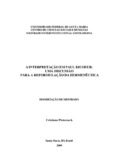| dc.creator | Pieterzack, Cristiane | |
| dc.date.accessioned | 2009-10-05 | |
| dc.date.available | 2009-10-05 | |
| dc.date.issued | 2009-08-17 | |
| dc.identifier.citation | PIETERZACK, Cristiane. INTERPRETATION IN PAUL RICOEUR: A DISCUSSION ON THE REFORMULATION OF HERMENEUTICS. 2009. 111 f. Dissertação (Mestrado em Filosofia) - Universidade Federal de Santa Maria, Santa Maria, 2009. | por |
| dc.identifier.uri | http://repositorio.ufsm.br/handle/1/9063 | |
| dc.description.abstract | This research pretends to examine the prosposal for revision of the hermeneutic project develened by Paul Ricoeur fron the viewooint of the debate between the Hermeneutic of Tradition and the Critique of Ideologies prososed by Gadamer and Habermas. The study begins discussing origins of the concept of hermeneutics and its relation to the notione of interpretation and comprehension as they appear in the thought of Heidegger, heir of a tradition which comes from Scheleiermacher and Dilthey. The study continues showing how, after a linguistic tour of philosophy, there is a growing recognition that the access to objectives comes about through a sense of good judgement in the historical world. Gadamer, after restoring the concepts of tradition and authority, show convincingly the link between historicity and comprehension. Habermas adds that he perceives a need to maintain a critical edge to human thought so that the hermeneutics not lead to a kind of linguistic idealism, once the limits of language are set aside. Placing himself in the dialogue between the hermeneutic reasoning of Gadamer and the critical reasoning of Habermas. Paul Ricoeur presents the possibility of critical-hermeneutic rational thought, developing a theory of text. To the extent that the hermentutic is an interpretation that leads to written language, it comes to possess, in
itself, indications that it not only belongs to a condition of historicity, but that it also offers a
critique os ideologies. What permits this is the conception of text, a model of distancing that
does not alienat, while remaining autonomous in relation to the author, the occurence of the original situation, the original recipient, and in relation to any other recipient. | eng |
| dc.format | application/pdf | por |
| dc.language | por | por |
| dc.publisher | Universidade Federal de Santa Maria | por |
| dc.rights | Acesso Aberto | por |
| dc.subject | Texto | por |
| dc.subject | Linguagem | por |
| dc.subject | Crítica | por |
| dc.subject | Text | eng |
| dc.subject | Language | eng |
| dc.subject | Critique | eng |
| dc.title | A interpretação em Paul Ricoeur: uma discussão para a reformulação da hermenêutica | por |
| dc.title.alternative | Interpretation in Paul Ricoeur: a discussion on the reformulation of hermeneutics | eng |
| dc.type | Dissertação | por |
| dc.description.resumo | O presente trabalho pretende apresentar a proposta de reformulação do projeto hermenêutico desenvolvido por Paul Ricoeur a partir do debate entre a Hermenêutica das
Tradições e a Crítica das Ideologias, protagonizado por Gadamer e Habermas. O texto inicia tratando da origem do conceito de hermenêutica e sua relação com as noções de interpretação e compreensão, como aparecem no pensamento de Heidegger, herdeiro da tradição que vem de chleiermacher e Dilthey. O texto segue mostrando como, depois do giro linguístico da filosofia, cresce o reconhecimento de que o acesso aos objetos se dá via sentido, num mundo
histórico. Gadamer, através da reabilitação dos conceitos de tradição e autoridade, evidencia vivamente essa questão da historicidade da compreensão. Habermas, por sua vez, percebe a exigência de se manter a vertente crítica do pensamento humano, sem a qual a hermenêutica desemboca num certo idealismo linguístico, uma vez que afasta os limites da linguagem. Mediando o diálogo entre a razão hermenêutica de Gadamer e a razão crítica de Habermas, Paul Ricoeur apresenta a possibilidade da realização de uma racionalidade hermenêuticocrítica, desenvolvendo uma teoria do texto. Na medida em que a hermenêutica é interpretação orientada para a linguagem escrita, ela passa a conter, em si mesma, indicações tanto da pertença à condição de historicidade quanto da crítica das ideologias. O que permite isso é
uma concepção de texto, modelo de distanciamento não-alienante, enquanto autônomo em relação ao seu autor, à situação original de realização, ao destinatário original, assim como em relação a qualquer outro destinatário. | por |
| dc.contributor.advisor1 | Rossatto, Noeli Dutra | |
| dc.contributor.advisor1Lattes | http://lattes.cnpq.br/2947312243186882 | por |
| dc.contributor.advisor-co1 | Ruedell, Aloisio | |
| dc.contributor.advisor-co1Lattes | http://lattes.cnpq.br/2665612492300787 | por |
| dc.contributor.referee1 | Gallina, Albertinho Luiz | |
| dc.contributor.referee1Lattes | http://lattes.cnpq.br/0750109262601371 | por |
| dc.contributor.referee2 | Fabri, Marcelo | |
| dc.contributor.referee2Lattes | http://lattes.cnpq.br/9122803302644811 | por |
| dc.creator.Lattes | http://lattes.cnpq.br/5938157489944307 | por |
| dc.publisher.country | BR | por |
| dc.publisher.department | Filosofia | por |
| dc.publisher.initials | UFSM | por |
| dc.publisher.program | Programa de Pós-Graduação em Filosofia | por |
| dc.subject.cnpq | CNPQ::CIENCIAS HUMANAS::FILOSOFIA | por |


